The Odd Life of Timothy Oberhelman
Tim Oberhelman waters plants in the greenhouse at Olathe West .
Timothy Allen Christopher Oberhelman grew up with a Mexican mother and a German father and was “just your typical Mexican-American-German family.”
What did that look like? According to him, it looked like Mexican food five nights a week and a mom that fed both him, his sisters, and all their friends. He got to come home from school every day to eat lunch with his mama and sisters Robin Anne and Kimberly Kay. Oberhelman’s mother, in his words, was “the Pillsbury dough girl of Mexican food.” But the best thing about her was her love for people an[d her love for him. Later on, he would get to return the love and sacrifices by saving his own mama’s life.
Oberhelman grew up on a farm in the small town of Gardner, Kansas, and always remained a small town country boy. Growing up, Oberhelman’s biggest role model was his mom’s brother, Raymond Vasquez. Vasquez wasn’t just a hero to his nephew but also to his country. He was a colonel in the United States Marine Corp and passed away in his third tour of Vietnam when Oberhelman was 13 years old. Before he passed, however, he taught Oberhelman several things. He taught him how to work hard and never give up, and he taught him how to run and play tennis. Oberhelman started playing tennis when he was five years old and absolutely fell in love with the sport. Vasquez was a huge part of this as he trained him and played with him often but also ran with him. Oberhelman says he was actually a better runner than he was a tennis player and was excellent at cross country and track in high school. In his college days, he was offered scholarships for both, but tennis was what he had in his heart, it’s what he loved to do, and it’s what he still loves.
Oberhelman’s teenage years were the late 60s and 70s. Bands like Led Zeppelin and The Eagles could be seen in concert for only $8-10, and you bet he went to see them. Oberhelman wasn’t musically inclined but he absolutely loved lyrics and there were many times he would get in his jeep and go on long drives by himself simply to listen to music. He was a huge fan Bob Dylan and “anybody who had a love song or a life song” caught his attention.
He admits he was a loner in high school and a quiet kid who “got a lot of crap for his long hair” and “would be considered a huge dork by today’s standards.” He wore flannels and overalls and played tennis with his headphones on. He says some of it was growing up on a farm and being “that kid who lived on a farm, did 4-H, and played tennis.” But nevertheless, he was a free spirit and loved being one too.
During the end of his high school days, he started feeling excruciating pain in his back to the point where he could barely play tennis. He went to the doctor who was a young man in his thirties, was full of energy and just out of medical school. The doctor’s name was Kendal Hall and he uncovered that Oberhelman had a disease called neurofibromatosis and a tumor on his spine.
This news came with great challenges and hardships including the loss of his scholarships for tennis and cross country. However, through all this doctor Kendall Hall encouraged him, telling him he was smart enough to go to college and causing him to actually consider it. At this time popular belief was that if he went to college he’d flunk out, but Hall believed in him more than most people. In exchange, Oberhelman taught him how to play tennis and over time they became close friends.
“He taught me how to use my brain and I taught him how to play tennis,” Oberhelman says.
Before going to college, Oberhelman did a lot of traveling and lived in several different states giving tennis lessons, and as he put it, “just living life.” But when that got tiresome he decided he wanted to do more than just teach tennis and he came back home to Kansas to go to college at last. He received a full ride scholarship to Johnson County Community College for tennis and played there for two years before becoming a walk-on for K-States team.
Doctor Kendal Hall got to see him play two years of college tennis, but no more before he tragically passed away in a car accident. When Oberhelman received this news he was as heartbroken as one would expect and received the task of identifying his good friend’s body at the morgue as well as being a pallbearer at the funeral. He not only lost a friend but someone who he called “one of his most inspiring role models. “
Throughout college, Oberhelman was always interested in biology, plants, and horticulture, and after he graduated he moved to Albuquerque New Mexico to become part of a greenhouse business that worked with potted plants, flowers, and hanging baskets. He enjoyed this so much and was so deeply intrigued by horticulture and growing plants that he moved back to Kansas and started his own greenhouse business, only this time for tomatoes and herbs.
During this time, Oberhelman’s mother was very sick and was in the hospital. She had many problems, but one of the most effective and fatal was that her kidneys were failing. Hearing this, Oberhelman says he had been taking her to dialysis and finally decided to talk to the doctor about donating one of his own kidneys if it meant saving his mom
“My mom didn’t want me to do it, but she was sick so I said to heck with that,” Oberhelman said.
They ran numerous tests and found that he was a perfect match for donating and that the operation could in fact proceed. On Dec. 25, 1993, Oberhelman successfully gave his mother his kidney and she lived for 11 more memorable years after that.
While owning a greenhouse business, Oberhelman was close friends with a woman who would bring her high school kids into the greenhouse regularly. He loved talking to the kids about what was happening and how it was happening and the science behind it and these things were the reasons he decided to become a high school teacher.
Today, as many know, Tim Oberhelman is the horticulture, urban sustainability, and biology teacher, here at Olathe West and also coaches and plays tennis often. He still has neurofibromatosis and has had nine tumors removed over the course of his life. But even with all the challenges and roadblocks, he wakes up every day and loves life. His greatest advice for young people is to never get a job.
“Do something that you love to do,” Oberhelman said. “I never regret getting up in the morning. I can’t wait to get to school. If everyone would stop worrying about how much money they made and did things they actually enjoyed, there would be so many more happy people.”



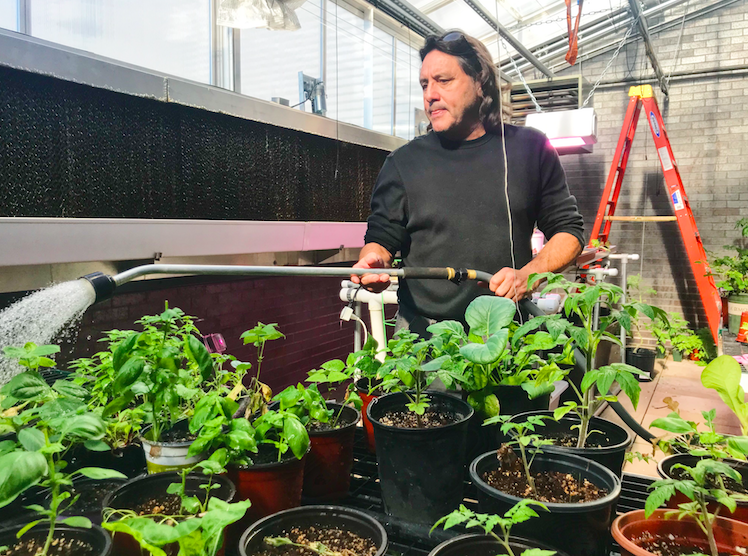

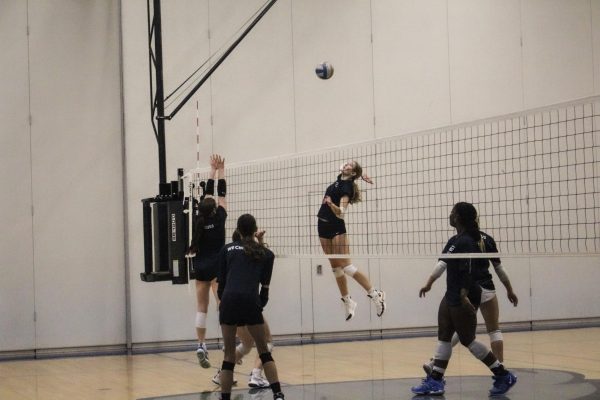
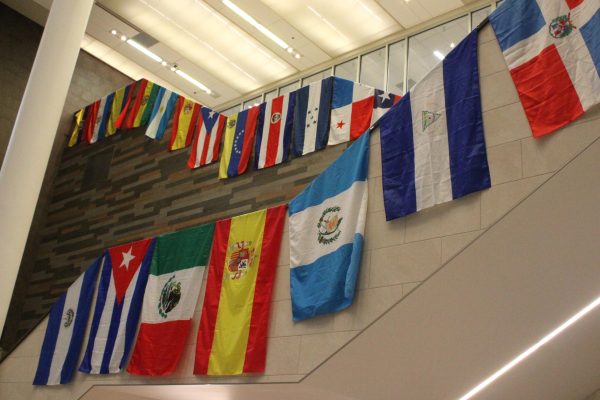
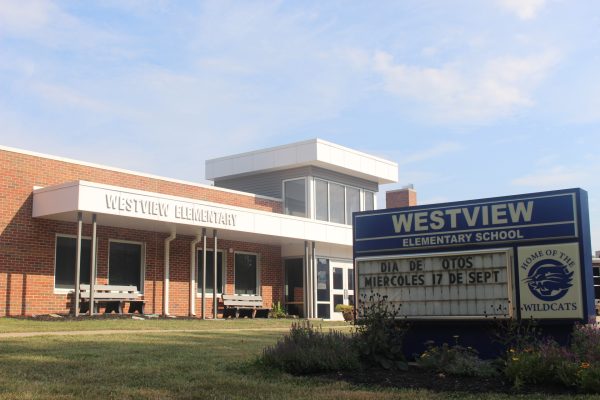
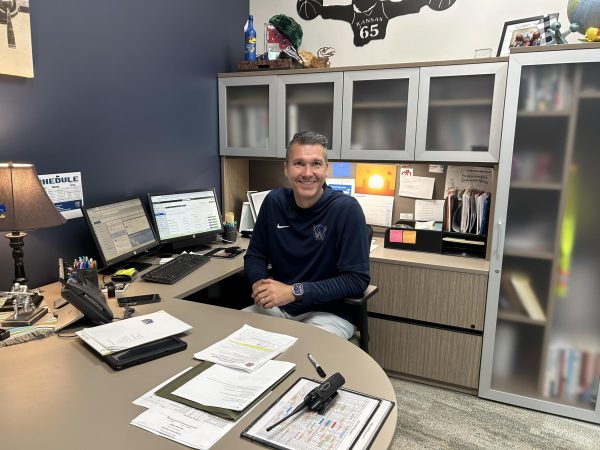
dahlia vang • Nov 13, 2018 at 10:35 pm
Such a great article! I know Mr. Oberhelman as the super wacky and cool horticulture teacher that likes to eat his way out od the greenhouse. A touching story no one would expect!